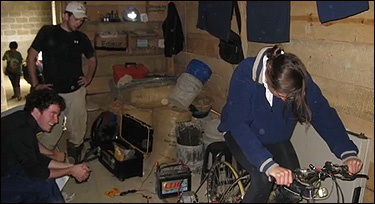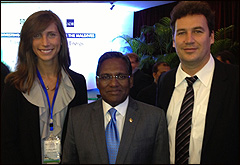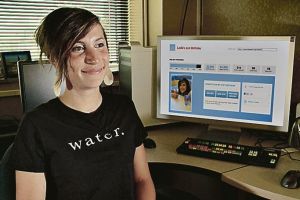
You can explore and engineer clean energy, too
Vanderbilt alumna Leslie Labruto’s early career trajectory illustrates just how many ways a young civil environmental engineer can accommodate both her heart’s leaning and her tangible talents – in as many places as possible.
Before she graduated from the School of Engineering in 2011, Leslie’s studies and service work had already taken her to Argentina, Peru and Guatemala. For her Senior Design Project, she created a solar/bike hybrid system that brought power for the first time to the rural community of Ulpan, Guatemala. Leslie also led a clean-water fundraising campaign to mark her 21st birthday by providing clean water for a community in Central Africa.

“Prior to entering Vanderbilt, I had never stepped foot in a developing country, though I had experiences abroad that sparked the ‘travel bug’ within me,” Leslie said. “Then when I began developing a tangible skill set at Vanderbilt through my studies as a civil engineer, I realized I could unite my love for engineering and my passion for exploring other cultures to solve global problems.” Leslie also picked up two minors: engineering management and energy and environmental systems.
But it was her work for the Clinton Foundation on the Climate Change Initiative (CCI) since graduation, helping to create clean energy solutions for countries across Africa and small island nations, which provided her best opportunities to make change happen. She went to work for CCI after earning her master’s at Imperial College in London, UK.
In December 2013 Leslie concluded her work with CCI to take her new job as an associate with Summit Partners in the equity investment firm’s Boston office, where she is focusing on emerging companies in the energy and technology sectors. Leslie also continues to serve as a Young Alumni Trustee on the Vanderbilt Board of Trust.
‘Thrown in the deep end’ of clean energy
“At the Clinton Foundation I was thrown in the deep end,” Leslie said. “In Cape Town, I sat with the Global Director of Clean Energy, who served as my mentor throughout my time at the Foundation.” The CCI team works with countries around the world to create and deploy clean energy plans, including the Solar Park in South Africa, which will be a 5-gigawatt photovoltaic and concentrated solar power (CSP) development along a transmission corridor in the Northern Cape.

South Africa’s Solar Park will be largest solar project in the world, incorporating the first large-scale deployments of concentrating solar power that can run as base-load power.
In island nations including the Seychelles and the Maldives, Leslie worked with the CCI team to replace costly diesel use with solar and other hybrid solutions. “With urgent implementation of these projects, small island nations have the potential to reshape their economic and environmental destiny and initiate clean energy programs that can spur action worldwide,” Leslie said.
The focus areas of Leslie’s CCI work reflect many of the socioeconomic hurdles challenging efforts to slow climate change. “Currently faced with a 10-gigawatt power deficit, South Africa generates nearly 90 percent of its electricity from coal-fired power stations,” Leslie said. Electricity prices have increased by more than 170% over the past five years, attributed largely to the funding of major capital expansion projects in the coal sector. Against this backdrop, the government of South Africa has been motivated to reform its energy-generation base.
CCI first approached the government of South Africa in 2008 with the concept of deploying a large-scale Solar Park in the Northern Cape, which has some of the strongest solar resources in the world measured by Direct Normal Irradiance (DNI). The signing of an MOU between CCI and South Africa’s Department of Energy followed, and planning began. South Africa began onsite field work in February 2013, and the project is estimated to come online by 2016.
Leslie’s work on the Solar Park spanned design, technology mix and policy development. Her CCI projects in small island nations utilized the same clean-fuel engineering skills in very different energy environments.
 “As climate change accelerates, small island nations will suffer a disproportionate share of global consequences already occurring today,” Leslie related, including rising sea levels, ocean acidification and increasing tropical storms. “These anthropogenic driven changes leave island nations vulnerable to devastating consequences, despite contributing very little to global greenhouse gas emissions.”
“As climate change accelerates, small island nations will suffer a disproportionate share of global consequences already occurring today,” Leslie related, including rising sea levels, ocean acidification and increasing tropical storms. “These anthropogenic driven changes leave island nations vulnerable to devastating consequences, despite contributing very little to global greenhouse gas emissions.”
Paradoxically, island nations heavily rely on imported diesel and petroleum products to meet domestic demand, which has resulted in some of the most expensive power prices in the world.
To combat the effects of climate change and economic hardships related to imported fuel costs, CCI’s Diesel Replacement Program for islands focuses on deploying renewable energy strategies – including solar, wind, biomass, waste, hydro, geothermal, ocean energy and clean water – tailored to the unique characteristics of more than 20 island governments, all of which have the desire to reduce fossil fuel emissions.

On these islands Leslie’s work included developing a 5-megawatt waste-to-energy facility in the Maldives, and she deployed rooftop solar in the Seychelles for large-scale energy consumers, domestic households, and small- to medium-sized enterprises.
“The locations were indeed incredibly exotic,” Leslie noted, but she also appreciated being based in Cape Town. “South Africa stands as one of the most enchanting places I have ever traveled to, let alone lived in. In Cape Town, where I was based, the palatial Table Mountain takes over the landscape.” The city and South Africa at large “is a country of contrasts,” she added. “Where there is lavish opulence at the Waterfront, there are expansive miles of townships, which hold the country’s poorest population.”
Work at CCI was never boring. “On a daily basis, I was fortunate to engage with a wealth of individuals who stemmed from different cultures and backgrounds, from Afrikaners to Greeks,” Leslie said. “My experience in Cape Town was an amalgamation of perspectives that challenged my opinions and reshaped my approach to problems.”
‘You don’t have to choose between passions’
Leslie’s habit of successfully linking personal passion with professional choice is vividly illustrated by her work as the co-author of “The Economics of Biophilia: Why Designing with Nature in Mind Makes Financial Sense,” published by Terrapin Bright Green during Leslie’s internship with that New York City consulting firm in 2012.
The hypothesis was first proposed by E.O. Wilson in his 1984 book Biophilia, claiming an extinctive bond between humans and other living systems. “Our work sought to quantify these results in dollars to see how society can economically benefit from designing with nature in mind,” Leslie stated. Paying attention to biophilic design in engineering was examined not only as a luxury, but also as a way to improve profits.
“Biophilia can increase the productivity of workers in a workspace, enable patients to heal faster in hospitals thus driving down hospital costs, enhance student performance in classrooms thus potentially leading to higher earning potential, prevent crime in community spaces, and create a more peaceful and welcoming environmental in retail spaces,” she added.
Leslie’s master’s work at London’s Imperial College became focused in an altogether different economic arena, yet also involved global market transformation issues. She became intrigued by the issue of rare earth mineral supplies globally, and China’s critical role in the supply chain of these metals, many of which are critical to renewable energy technologies.
“Ultimately, I found that my thesis provided me with the opportunity to look at energy issues from a geopolitical point of view,” Leslie said. “To strictly look at the renewable energy landscape in a financial or technical vacuum would be useless unless I could not only understand the greater picture but most importantly add value to this space.” Her thesis, “Contrasting perspectives on China’s rare earths policies: Reframing the debate through a stakeholder lens,” was published in the Journal of Energy Policy.
Leslie’s top job-seeking advice for engineering grads
 “Network, network, network − with confidence! That is the greatest advice I can give to a recent grad looking to enter today’s job market. My mother always told me that fortune favors the bold, and this proverb could not be more applicable in any other context. I’ve learned that people love helping eager graduates, and opening a door through networking is the greatest way you can help yourself. Don’t be afraid to pick up the phone and call someone you’ve never spoken with before because inevitably, your pro-active approach in making that phone call will impress the heck out of that professional.”
“Network, network, network − with confidence! That is the greatest advice I can give to a recent grad looking to enter today’s job market. My mother always told me that fortune favors the bold, and this proverb could not be more applicable in any other context. I’ve learned that people love helping eager graduates, and opening a door through networking is the greatest way you can help yourself. Don’t be afraid to pick up the phone and call someone you’ve never spoken with before because inevitably, your pro-active approach in making that phone call will impress the heck out of that professional.”- “My path to the Clinton Foundation was a great example of the importance of networking with confidence. I moved to South Africa without a job, without a direction, and nothing but $900 in my pocket. Talk about a risk! I identified some target global companies and cold-called the local CEOs. Most were taken aback that I had phoned in the first place, but every single one offered me the opportunity to interview despite no job vacancies listed. One interviewer said he could see me working in the NGO space as a technical engineer, and that contact connected me with CCI’s Global Director of Clean Energy.”
As Leslie settles back into the United States and her new work with Summit Partners, she sounds intensely committed to continuing to helping make tangible changes happen for others. On Vanderbilt’s Board of Trust she plans to remain an aggressive advocate for recent grads, for example, and she continues to visualize her contributions in terms of discovering answers to global environmental challenges.
On the Vanderbilt Board Leslie chairs the Student Affairs committee, and also serves as board member on the Audit, Investments, Medical Center, Athletics, and Governance committees. “Personally, I am committed to enhancing the career opportunities made available to undergraduate and graduates students by connecting more recent alums in leading companies to current students,” she described. Working with three former Vanderbilt graduates, Leslie is spearheading the new Vanderbilt University Industry Champions program in tandem with the Center for Student Professional Development.
“By speaking with successful Board members who support the initiative, we are seeking to break down the barriers between students connecting directly with VU alumni at prospective companies,” Leslie said. The Champions program platform is currently on LinkedIn, where 18 industry champions from leading finance and management consulting firms who have engaged with undergraduate students. “Many offline chats are occurring that have lead to job interviews,” Leslie added. “We are incredibly excited by this program and we are eager to expand to more sectors.”

Leslie will also continue to be personally hooked into charity: water, the organization based out of New York City where the proceeds of her 21st birthday campaign were directed.
“I remember chatting with my middle sister one day when I was deciding on a master’s program. I asked her, ‘Which do I choose?! Clean water or clean energy? I care so passionately about them both!’ And she delivered the perfect answer, ‘In life, you don’t have to choose between passions. Neither goes away. Find ways to satisfy your love for delivering both by striking a balance.’ She hit the nail on the head,” Leslie said.
“Moving back to the U.S., I was truly happy to land at the airport without looking back. I feel I have cultivated experiences abroad that will help find fundable solutions to the global injustices and problems I witnessed and lived in the midst of abroad.
“I’m ready to start a whole new chapter.”
![]()
Labruto wins 2011 Young Alumni Trustee election
Changing the environment changed her life